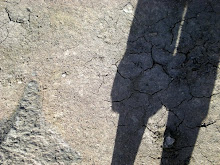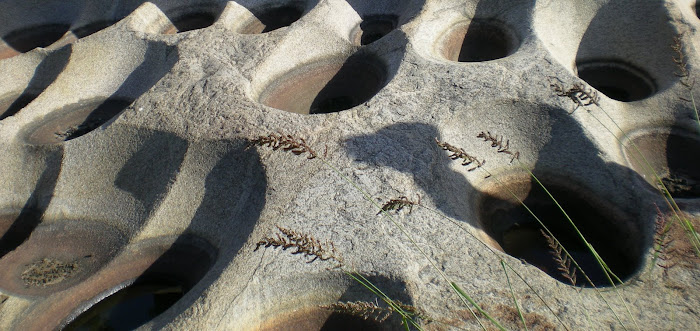On Monday we left for Nimule, a border town by Uganda in the southernmost area of Eastern Equatoria. It was suppose to be a four hour drive, but ended up taking us eight-partly because of an hour long stop over in Pageri and partly because of a truly awful road due to the pounding rainstorm the night before. The drive itself was really beautiful-the first half was just retracing the road to Juba, which I love because of the walls of rock on either side with villages nestled in the basin, but the second half turned off towards Magwi in the south. What I found interesting is that though Nimule, and even Magwi are relatively close to Uganda, the drive down to the towns was an object lesson in poverty. We passed several IDP camps-real IDP camps not merely relocated people in established towns. They barely looked like camps at all. Burned land and charred tree stumps sticking up in the air like black needles were situated next to devastated huts with plastic sheeting over the roofs. The huts themselves were patchy, tilted, and no real protection from the elements at all, and women and children moved slowly from hut to hut, putting clothing to dry on the scrub bushes left to them. The men just sat there, some in army fatigues, some in torn undershirts, staring blankly at our car.
Other villages were vibrant and alive and women in bright clothing walked alongside our car, carrying various things in buckets on their heads. But the most beautiful part of the drive happened when we hit just past Pageri, going down Gordon’s Hill, where the road turned to reveal the entirety of southern Eastern Equatoria, and a fair part of both the Nile and Uganda, stretched out before us. You could see almost the start of the Nile at Lake Victoria, the shiny cluster of buildings signifying the entry point for IDPs returning from Uganda, and the entire village of Nimule scattered and spread out ahead. The sun was setting and the Nile was shimmering and curving like a snake and mountains framed the entire view like a picture frame. On the other side of the road was a lush valley of thick vegetation-the national park and game reserve-periodically interrupted by green mountains.
Our first stop, in Pageri, was very nice; we sat in a lean-to thatched with papyrus reeds and plastic woven bags and drank Bell (a Ugandan beer) and chatted with the priests we were traveling with and their families. I was seated next to Father Mawa on my right (who is so wonderful-one of the most steadying and elegant Father’s that I have met) and two women on my right. The closest one looked like she was roughly my age, and the one next to her looked about 20 years older, the look of a woman starting to age, and wrinkle. But these appearances were deceiving. Regina, the lady next to me, was actually 40, and the woman next to her was about 50. Regina was the mother of Taban, (who looked more like her brother) and eventually Regina’s mother came in (Elizabeth) who was sixty but looked forty and sang church songs to me. I already knew that people here don’t age visibly but I had forgotten how disconcerting and amazing it was. After three beers each (they automatically refill them), George and I attempted to use a latrine, which we quasi-broke the door off of, and I may have peed on my foot, and then we got in the car, having shaken everyone’s hand, and with the strong smell of dried fish on our hands.
We stopped once more, in Loa. Loa was about 25 minutes away from Pageri, if that and all the buildings we saw were made of brick. You round a bend and the first thing you see is a huge brick church-in the mold of the one in Isoke, although this one is older; a church which wouldn’t look out of place in an Italian pastoral scene. Next to the church was a long brick building with an arched porch, and while the fathers stood and chatted there, I went off to investigate the church. It was locked, but they opened it for us (while I talked to some old ladies, none of whom spoke English, but rather Mahdi, of which I know very little-but we got by).
The church was incredible and huge. It was easy to see vestiges of it’s former opulence through the dust coating the floors, but the actual sight was heartbreaking, if breathtaking. A long aisle stretched back-completely empty except for the remnants of shattered stained glass windows. All the benches had been removed. In the left hand niche, a statue of the Virgin Mary (white, Italian looking) was cuddling the headless body of the Baby Jesus, the decorated plaster chipping and flaking off onto the floor. On the right side, a tiny, albeit newer Virgin Mary sat on a small shelf, dwarfed by the huge alcove behind her. The floor leading up to the later was laid with felled tree branches-the makeshift seats for the congregation, providing enough space for maybe 50 people. The alter was decorated, but dusty, and the Jesus figure on the cross behind it looked down on the shattered glass that had been the window he was set beside. In the ceiling, bullet holes riddled the metal roof like so many stars, sending sharp blades of light down into the church itself, illustrating the bullet’s trajectory. Even in its decay it was a beautiful church, but the Father accompanying us told us that it had been attacked by armed Arabs who had taken all the benches, cut up the statues, stolen the books and burned them, and shot through the ceiling. Some services are still held there, but it was clear that the goal of the attack had mostly been successful.
Subscribe to:
Post Comments (Atom)



2 comments:
That is so sad. I am surprised that the Arabs attacked that far to the south. But I suppose that was during the civil war. There is still trouble in the region, by the way. I have been trying without success to locate Pageri on a map. Apparently elements of the LRA and the SPLA clashed there a month or so back and I believe that the fight has put the peace negotiations between the LRA and the Ugandan gov't on hold.
The panorama sounds like some African Ansel Adams landscape. I think I would love bringing my camera and black & white film.
Love,
/dad, who zoivzu's you very much!
Nile sounds amazing.
It horrifies me to picture anyone destroying somebody's place of worship.
When you sit with people what sort of things do you talk about?
Post a Comment